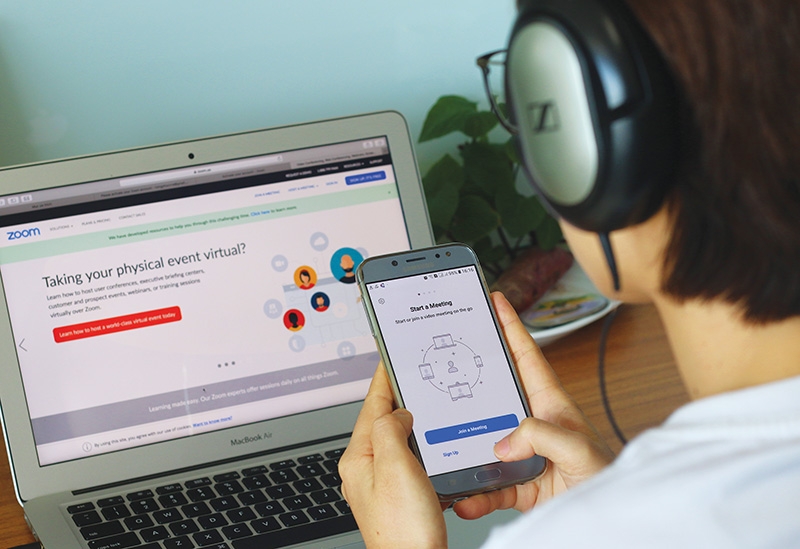
As people go into voluntary isolation during the health crisis, businesses have to depend on online tools to deal with their workload. Indeed, the number of downloads for applications like Slack, Microsoft Teams, Zoom, Tencent Conference, and WeChat Work has increased as much as five times against early this year, according to the latest data from Sensor Tower, a popular analytics platform for tech developers and investors.
The data showed that the applications had lured in 1.4 million new users on the App Store and Google Play in the first week of January, which rose to 6.7 million in the first week of March.
The high demand for these solutions has given a leg up to the stocks of tech firms these days. Specifically, Zoom rose 60 per cent since the beginning of the year.
Microsoft on March 30 also recorded a hike of 70 per cent, or 40 million users, for its video call application Skype. Moreover, the US-based tech giant is the only firm with a trillion-US dollar market capitalisation, while big names like Amazon, Apple, and Alphabet (the parent company of Google) have all slipped below the trillion dollar mark due to the COVID-19 pandemic, according to Bloomberg.
Grasping the great opportunities, local tech firms like VNPT and Mat Bao have quickly launched their work-from-home services. Specifically, VNPT brought out the V-com software package specialised in document management, organising online conferences and meetings, and digital signature. Moreover, aiming to support companies amidst the outbreak, VNPT offers the product with a 90 per cent discount.
Mat Bao – a Microsoft partner specialised in providing technology services on the US firm’s cloud computing platforms – refuses to be left behind and has introduced a similar suite of solutions which it will provide free-of-charge for 1,000 companies for six months.
Regarding overseas businesses, last week saw a partnership between Samsung Vina and US-based Cisco to develop a work-from-home solution named Webex on Flip specialised in online meetings. The platform is available on all operating systems like Windows, iOS, and Android, for mobile devices like laptops, tablets, and smartphones.
Viettel IDC also inaugurated its latest virtual computer, Cloud PC, which virtualises the data of users’ desktop computers and transfers them to the cloud computing system of Viettel IDC. Thanks to this, users can easily access their files from any device.
“As more and more companies allow staff members to work from home due to the epidemic, Cloud PC is a good solution to conduct a seamless transition,” said Hoang Van Ngoc, director of Viettel IDC.
Cloud PC also resolves paramount problems related to online working like data leaks or security breaches as it runs on Viettel IDC’s cloud computing technology and is protected by many layers of security.
Assessing the prospects of pouring capital into this new business, one specialist at Viettel IDC told VIR that while work-from-home solutions are expected to boom in the short term, the trend will stick around even longer.
“Switching to online tools is part and parcel of the digital transformation trend, so even after the pandemic is gone, there will be great interest in using these products. In the future, work-from-home solutions will replace traditional working methods,” he explained.
As foreign and local players race to offer work-from-home services, competition to gain a foothold in the market is unavoidable. However, according to the Viettel IDC specialist, Vietnamese suppliers have an edge on overseas firms. He told VIR major local companies dislike having any of their data transferred overseas, and so “prefer using local services despite their smaller scale, rather than giants like Google or Amazon.”
Moreover, there is little faith in data security when using overseas services. According to the Ministry of Information and Communications, within February about 288 cyber attacks took place in Vietnam, up 1.8 per cent on-month, and down 49.7 per cent on-year. As most attacks came from other countries, local businesses are giving priority to domestic services.


